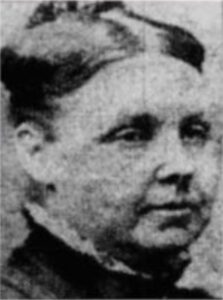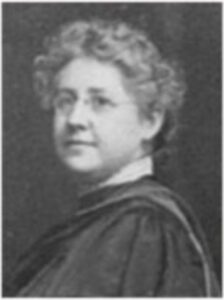

WOMEN OF ACHIEVEMENT
2023
HERITAGE
for women whose achievements still enrich our lives:
Elizabeth Fisher Johnson (1835-1883) and Lillian Wyckoff Johnson (1864-1956)
When Mr. Johnson’s daughter, Miss Lillian Wyckoff Johnson, returned to Memphis from school in 1887, she became a teacher in the Hope Night School. When her father moved away from the city she was not only principal of the school but, with her father’s enthusiasm for the success of the institution that had become an expensive one to run, this brave young teacher collected from Memphis merchants $1,500 every year for its maintenance till it became one of the public schools in 1892. She taught in Memphis at the Clara Conway Institute for Girls and also the Hope Night School for working students, beginning as a teacher there and becoming principal and business manager, finally making it part of the Memphis city school system. The school was a pioneering effort to give working people better lives.
This mother-daughter duo were leading pioneer activists of their generations in Memphis.
Elizabeth Fisher Johnson, born to a prominent family and married to a wealthy merchant, believed that women should be public activists as were men in a time when women were supposed to be seen and not heard.
In the 1870’s she founded the Woman’s Christian Association, the first city-wide group of women reformers, which worked to improve the lives of women and children in Memphis. Elected first president, she served until her death in 1883. The organization pioneered what later would be called “social housekeeping,” the idea that women had to work to clean up society as well as the home.
They started projects to provide immediate relief but also to educate women with skills for paying jobs. Their most daring project, and the most controversial, was trying to rehabilitate prostitutes by teaching them employable skills such as sewing and domestic work at a time when respectable women and men despised them.
She was also a key leader in bringing the Women’s Christian Temperance Union (WCTU) to Tennessee. In the 19th century, WCTU members saw themselves fighting the sin of alcohol, but also as fighters against domestic violence and the break-up of homes, because prohibiting alcohol was seen as key to solving these problems. You could say it was the largest domestic violence organization of the 19th century.
Elizabeth Johnson saw the WCTU as a way to help women and families and to change society. Johnson became the first state president, but died at the age of 47, only six months after being elected.
Elizabeth Fisher Johnson had eight children, including her daughter, Lillian Johnson, who became an activist in education for women and the poor.
Lillian pioneered in higher education for women, graduating from the University of Michigan with a B.A., then doing graduate studies in Germany and the Sorbonne in France. She received her Ph.D. at Cornell University in 1902, all at a time when these academic achievements were almost unheard of for women.
She taught in Memphis at the Clara Conway Institute for Girls and at the Hope Night School for working students, beginning as a teacher there and becoming principal and business manager. She collected $1,500 from Memphis merchants each year for Hope’s maintenance until finally making it part of the Memphis city school system. The school was a pioneering effort to give working people better lives.
Lillian taught at Vassar College for four years and while there laid the foundation for the Southern Association of College Women, started in 1903. In 1904 she became president of Western College for Women in Oxford, Ohio, a position she held until 1908. Then she returned to Memphis and taught history at what was later Central High School.
As chair of the Education Committee of the Tennessee Federation of Women’s Clubs and the Nineteenth Century Club, she was one of three women seen as the primary leaders in getting the West Tennessee Normal School (now the University of Memphis) established in 1912. Johnson saw this as an opportunity for women to get a higher education and become teachers, as most Normal School students were women.
She became interested in rural education and moved to Monteagle, in Grundy County, TN, in 1915, one of the 10 poorest counties in the nation. For the next 17 years she worked to educate and make life better for south Appalachian farming families. After failing to establish a cooperative of her own, she donated her house and property in Summerfield in 1932 to Myles Horton who began the Highlander Folk School there with a policy of being an integrated institution from the time it opened. The school became known for its activism in training leaders in labor organizing and civil rights.
Lillian later retired to Florida, where she cofounded the Bradenton Community Welfare Council, made up of African-American and white women’s organizations; it established an African-American Youth Center and worked on other interracial projects.
Lillian Wycoff Johnson died there in 1956 at the age of 96, having never married.

